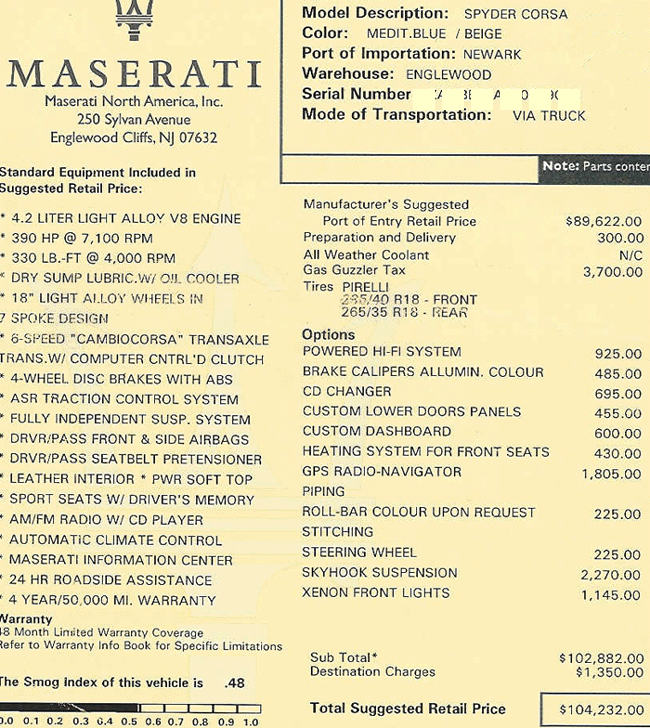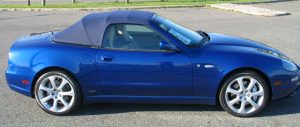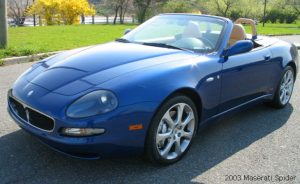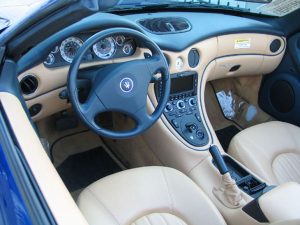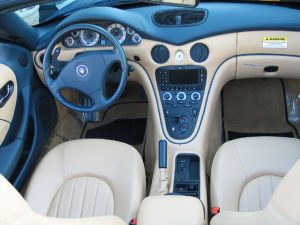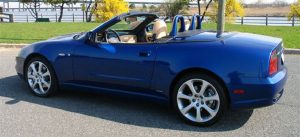Open air motoring returned to the Maserati line-up after a seven year absence with the aptly named Spyder GT, launched at the Frankfurt motor show in the fall of 2001. The model was more than just a shortened version of the 3200 GT. In fact, the Maserati Spyder debuted the all-new normally-aspirated 4.2 liter V8 engine which would be fitted to the new Coupé GT the following year. Developing 390 hp at 7,000 rpm (an exceptional output for a large displacement naturally aspirated engine, with over 90 hp/liter), it rocketed to a top speed of 280 kph (174 mph) with lightning-quick acceleration.
The styling was a direct derivation of the 3200 GT penned by Giugiaro, but the wheelbase was much shorter as the car was intended strictly as a two-seater with roll hoops behind the headrests. The shorter wheelbase was clearly intended to further enhance the handling qualities of the chassis and make the Spyder extremely agile. New taillights were dictated largely by adaptation to the US market, where Maserati returned with the Spyder in 2002.
Mechanically-speaking, the changes extended well beyond the engine with a revised chassis, new transmission and gearbox. In true sports car fashion, the new gearbox/differential unit was mounted in a transaxle layout. Inside the car, the center console now hosted the “Maserati Info Center”, a 5.8 inch color display which acted as a user interface for the trip computer, sound system and automatic climate control. A GPS navigation system was optional.
Technical Specifications
| Model | Spyder GT |
| Maserati internal code | Tipo M138 ADE |
| Production start | 2007 |
| Number Produced | |
| Ignition | Bosch ME 7.3.2 ignition and injection |
| Lubrication | dry sump, pumps in single unit with cooling pumps |
| Transmission | manual 6-speed + reverse, transaxle layout, rear-wheel drive, hydraulic dry twin-plate clutch |
| Reduction | 1:3.73 |
| Gear ratios | I=3.286; II=2.158; III=1.609; IV=1.269; V=1.034; VI=0.848; R=3.565 |
| Chassis | stress-bearing steel with tubular superstructure integrated in the front |
| Front suspension | light alloy double wishbones, shock absorbers and coil springs, anti-dive features and anti-roll bar (Skyhook system for continuous automatic damping adjustment on request) |
| Rear suspension | light alloy double wishbones with additional strut for roll control, shock absorbers and coil springs, anti-roll and toe-in regulator bars (Skyhook system for continuous automatic damping adjustment on request) |
| Brakes | Brembo with 4-channel Bosch ABS and EBD (Electronic Brake Distribution) |
| Brakes front | 13×1.3 inch cross-drilled ventilated disks |
| Brakes rear | 12.2×1.1 inch cross-drilled ventilated disks |
| Steering | servo-assisted rack and pinion |
| Cooling system | water cooling |
| Length | 169.4 inch (4,303 mm) |
| Width | 71.7 inch (1,822 mm) |
| Height | 51.4 inch (1,305 mm) |
| Wheelbase | 96.1 inch (2,440 mm) |
| Front track | 60.0 inch (1,525 mm) |
| Rear track | 60.6 inch (1,538 mm) |
| Dry weight | 3,571 lbs (1,620 Kg) |
| Curb weight | 3,792 lbs (1,720 Kg) |
| Tires front | 235/40 ZR 18 (8J) |
| Tires rear | 265/35 ZR 18 (9.5J) |
| Wheels | light alloy (7 or 15 spoke); 8J-18 front, 9.5J-18 rear |
| Top speed | 176 mph (285 kmh) at 7,550 rpm |
| Bodywork | two-door, two-seater convertible with power roof |
| Fuel tank | 19.3 Imperial gallons / 23.2 US gallons (88 liters) |
| 0-62 mph | 4.9 sec (0-100 kmh). |
| Quarter mile | 13.3 sec. |
| Standing mile | 23.9 sec. |
| Production dates | 2001-2007 |
| Engine | 90° V8 with crankcase and cylinder heads in aluminum alloys |
| Bore and stroke | 92 x 80 mm |
| Total displacement | 4,244 cc |
| Displacements (unitary) | 530.5 cc |
| Compression ratio | 11.1:1 |
| Maximum power | 390 CV (287 kW) at 7,000 rpm (maximum engine speed 7,600 rpm) |
| Maximum torque | 330 lbs/ft (451 Nm) at 4,500 rpm |
| Timing gear | four valves per cylinder, two chain-driven overhead camshafts per cylinder bank, continuous valve timing control system |
| Fuel feed | Bosch ME 7.3.2 injection with electronic control, electronic drive-by-wire throttle control |
| Engine weight | 405.7 lbs (184 kg) |
| Weight distribution | 53%front / 47%rear |
